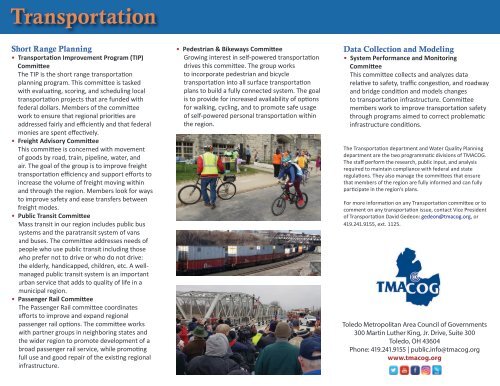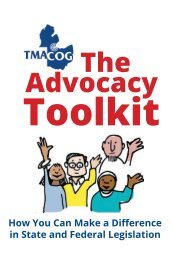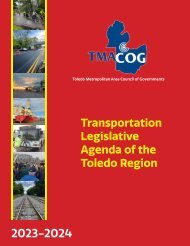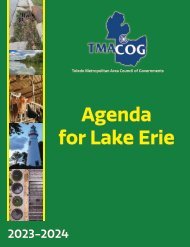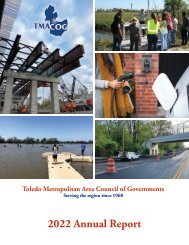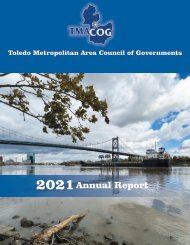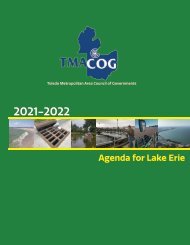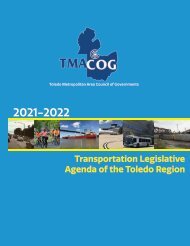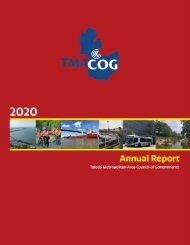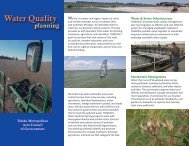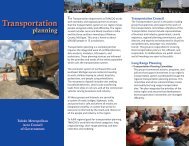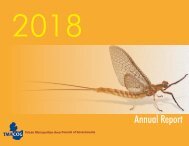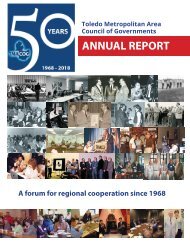trans_trifold
Create successful ePaper yourself
Turn your PDF publications into a flip-book with our unique Google optimized e-Paper software.
Transportation<br />
Short Range Planning<br />
• Transportation Improvement Program (TIP)<br />
Committee<br />
The TIP is the short range <strong>trans</strong>portation<br />
planning program. This committee is tasked<br />
with evaluating, scoring, and scheduling local<br />
<strong>trans</strong>portation projects that are funded with<br />
federal dollars. Members of the committee<br />
work to ensure that regional priorities are<br />
addressed fairly and efficiently and that federal<br />
monies are spent effectively.<br />
• Freight Advisory Committee<br />
This committee is concerned with movement<br />
of goods by road, train, pipeline, water, and<br />
air. The goal of the group is to improve freight<br />
<strong>trans</strong>portation efficiency and support efforts to<br />
increase the volume of freight moving within<br />
and through the region. Members look for ways<br />
to improve safety and ease <strong>trans</strong>fers between<br />
freight modes.<br />
• Public Transit Committee<br />
Mass <strong>trans</strong>it in our region includes public bus<br />
systems and the para<strong>trans</strong>it system of vans<br />
and buses. The committee addresses needs of<br />
people who use public <strong>trans</strong>it including those<br />
who prefer not to drive or who do not drive:<br />
the elderly, handicapped, children, etc. A wellmanaged<br />
public <strong>trans</strong>it system is an important<br />
urban service that adds to quality of life in a<br />
municipal region.<br />
• Passenger Rail Committee<br />
The Passenger Rail committee coordinates<br />
efforts to improve and expand regional<br />
passenger rail options. The committee works<br />
with partner groups in neighboring states and<br />
the wider region to promote development of a<br />
broad passenger rail service, while promoting<br />
full use and good repair of the existing regional<br />
infrastructure.<br />
• Pedestrian & Bikeways Committee<br />
Growing interest in self-powered <strong>trans</strong>portation<br />
drives this committee. The group works<br />
to incorporate pedestrian and bicycle<br />
<strong>trans</strong>portation into all surface <strong>trans</strong>portation<br />
plans to build a fully connected system. The goal<br />
is to provide for increased availability of options<br />
for walking, cycling, and to promote safe usage<br />
of self-powered personal <strong>trans</strong>portation within<br />
the region.<br />
Data Collection and Modeling<br />
• System Performance and Monitoring<br />
Committee<br />
This committee collects and analyzes data<br />
relative to safety, traffic congestion, and roadway<br />
and bridge condition and models changes<br />
to <strong>trans</strong>portation infrastructure. Committee<br />
members work to improve <strong>trans</strong>portation safety<br />
through programs aimed to correct problematic<br />
infrastructure conditions.<br />
The Transportation department and Water Quality Planning<br />
department are the two programmatic divisions of TMACOG.<br />
The staff perform the research, public input, and analysis<br />
required to maintain compliance with federal and state<br />
regulations. They also manage the committees that ensure<br />
that members of the region are fully informed and can fully<br />
participate in the region’s plans.<br />
For more information on any Transportation committee or to<br />
comment on any <strong>trans</strong>portation issue, contact Vice President<br />
of Transportation David Gedeon: gedeon@tmacog.org, or<br />
419.241.9155, ext. 1125.<br />
Toledo Metropolitan Area Council of Governments<br />
300 Martin Luther King, Jr. Drive, Suite 300<br />
Toledo, OH 43604<br />
Phone: 419.241.9155 | public.info@tmacog.org<br />
www.tmacog.org
Transportation<br />
planning<br />
Toledo Metropolitan<br />
Area Council<br />
of Governments<br />
The Transportation department at TMACOG works<br />
with members and regional partners to ensure<br />
that the <strong>trans</strong>portation system in our region moves<br />
people and goods safely and efficiently. The region<br />
served includes Lucas and Wood counties in Ohio<br />
and the three southern townships of Monroe<br />
County, Michigan. This area is home to about<br />
600,000 people in 75 jurisdictions.<br />
Transportation planning is a complex job that<br />
requires the integrated work of certified planners,<br />
data analysts, modelers, GIS experts, and<br />
technicians. These planning services are informed<br />
by the priorities and needs of the entire population<br />
which uses the <strong>trans</strong>portation system.<br />
The commuter system of northwest Ohio and<br />
southeast Michigan serves motorists traveling<br />
to work, children busing to school, bicyclists,<br />
pedestrians, and people using wheelchairs.<br />
The movement of goods includes vans making<br />
household deliveries, semi trucks <strong>trans</strong>ferring<br />
loads from ships or rail cars, and all the commercial<br />
vehicles serving businesses and industry.<br />
All these groups and interests are served by<br />
a system of roads, bridges, highways, trails,<br />
and ports that is safe and where all modes are<br />
integrated smoothly. A system that works for<br />
everyone is informed by the needs and choices of<br />
all the people and industry in the region.<br />
To fulfill regional goals for <strong>trans</strong>portation planning,<br />
TMACOG’s work falls into three categories: long<br />
range planning, short range planning, and data<br />
collection and modeling.<br />
Transportation Council<br />
The Transportation Council is the policy-making<br />
group that approves and supports the work of<br />
the <strong>trans</strong>portation committees. Members of the<br />
Transportation Council include representatives<br />
of business and industry, government, county<br />
engineers, regional planning commissions, park<br />
districts, and experts and advocates for bicyclists<br />
and pedestrians, passenger rail, and public<br />
<strong>trans</strong>it. This group is responsible for ensuring<br />
that <strong>trans</strong>portation policy is fair, efficient, and<br />
responsible. Its deliberations are public record<br />
and all meetings are open to the public.<br />
Long Range Planning<br />
• Transportation Planning Committee<br />
This group recommends actions, programs, and<br />
policies that support investment in our region’s<br />
<strong>trans</strong>portation system coordinated through the<br />
regional <strong>trans</strong>portation planning process. This<br />
committee and ad hoc subcommittees create<br />
and modify the long range <strong>trans</strong>portation<br />
plan. The plan integrates the priorities of the<br />
entire region and ensures that development<br />
and <strong>trans</strong>portation investments are managed<br />
efficiently.


